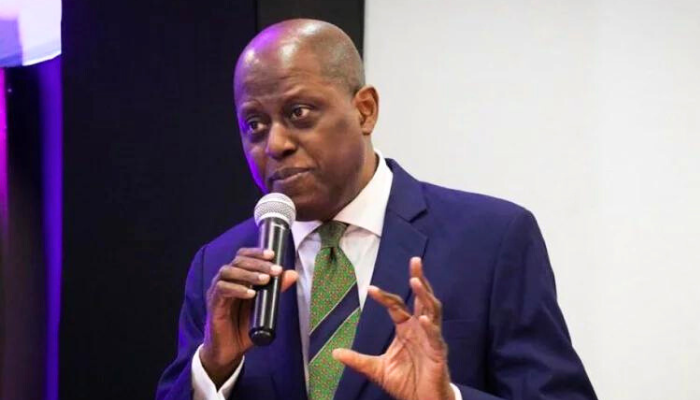Another misguided policy advice on BDCs
Last week’s economic policy event had a worrying headline and a well-articulated message from the Special Adviser on Economic Affairs to the President Bola Tinubu, Tope Fasua. The Abuja Chamber of Commerce and Industry (ACCI) organised the event with the theme: “Unification of foreign exchange and the effect of fuel subsidy removal on the business […]

Last week’s economic policy event had a worrying headline and a well-articulated message from the Special Adviser on Economic Affairs to the President Bola Tinubu, Tope Fasua. The Abuja Chamber of Commerce and Industry (ACCI) organised the event with the theme: “Unification of foreign exchange and the effect of fuel subsidy removal on the business community”.
Fasua gave public advice to his principal, Tinubu, and the new CBN Governor, Olayemi Cardoso, who is still finding his feet. And at some point, it felt like an economic evaluation of these policymakers. He went about with many assertions. I will not judge the appropriateness of an adviser who goes public to advise his principal. I will also not probe whether it is within his scope to advise an independent CBN governor on implementing a policy. However, I find the tone of some of his comments to be a bit worrying.
He asserted that Nigeria could not manage 5,691 Bureau de Change (BDCs), with everybody “selling money on the street”, and then went on to suggest that a structural reform was needed in the BDC sector to reduce the number of operators in the country to just 200. His advice is similar to the report made by the presidential National Economic Sub-Committee earlier in June, where they proposed removing all forex intermediation windows and raising the capital requirements of BDCs to ensure only the strong BDCs are allowed to operate like the international company, Travelex.
Fasua’s statement felt like a Déjà vu. Those following this government’s agenda can relate. Clearly, it was not one of those impulsive statements that politicians make. It was a carefully crafted response targeting a certain group, similar to Tinubu’s speech on why he removed the fuel subsidy, where he said there are “elite of the elites” benefiting from the fuel subsidy.
Eid-ul-Maulud: Show practical love to one another, Diri urges Muslims
DRC colonel sentenced to death over Goma anti-UN protest deaths
At that particular instance, I thought, when would these people start thinking of policies to benefit people instead of harming them? Had they respected the basic economic principles, they would be thinking of policies that would only guarantee a situation where people are better off without anyone being worse off. As an ethical professional, I believe people’s morality should be questioned for suggesting that closing down over 5,000 thriving businesses will be a positive thing for a struggling economy like Nigeria.
I wonder why they ignore the fact that the average Nigerian consumer relies on one of these 5,000 BDCs “on the street” to buy their forex for trading, health services, travel, pay for education, and other overseas transactions. Have they forgotten that these customers cut across all sections of the economy? These are the ones who will be affected when things go bad. But, no, they are not thinking about that. One won’t be wrong to think there is an agenda behind this.
When fuel subsidy was removed, the narrative was that only ‘certain elites’ would be suffocated, but look at where we are. All we hear is, ‘Let the poor breathe.’ Today, Nigeria is expected to spend N1.125 trillion on poor households in the next three months and pay N35,000 to civil servants for the next six months while they keep negotiating with the NLC to avert strike. All this is because they want to fight a certain elite of the elites.
Fasua further noted that Nigeria spent over $45bn annually importing refined petroleum and other products. He claimed that the country’s biggest import came from fuel and diesel, which took about $25bn to $30bn annually. As an import-dependent economy, there will always be a problem when the primary source of foreign exchange-oil export-is affected because it impacts the availability of dollars in the market, making it a supply issue.
If the data is correct, which I cannot confirm, he ought to know that jumpstarting the local refineries will remove $30bn from the $45bn on imports-a 67 per cent reduction in forex demand for major imports. Increasing other production will reduce import demand further. So, domestic production of key products would have solved Nigeria’s foreign exchange problems. This should have been the point of discussion at a business event.
I can understand if they have a problem with BDCs for other reasons, like reducing the corporate burden on the CBN and considering moving their regulatory body to another agency. After all, the CBN can do it with less burden. But it will be a cardinal sin to reduce their numbers by 95 per cent, and think it will solve the forex crisis. Aside from killing off over 5,000 thriving businesses, this will only distort the sector that wants to be dictated by market forces. BDCs are competing with banks, and weakening the competition makes the market weaker, and the reduction will undoubtedly generate another “shock” to an already volatile market.
Let’s not forget that a similar situation happened under the last CBN Governor, Godwin Emefiele, where they blamed AbokiFx for influencing speculators and later banned selling forex to BDCs. People celebrated it, mainly for the name. But did it work?
So, let’s be clear: reducing BDCs to curb forex volatility is like taking the wrong medicine; it will only complicate the sickness.
